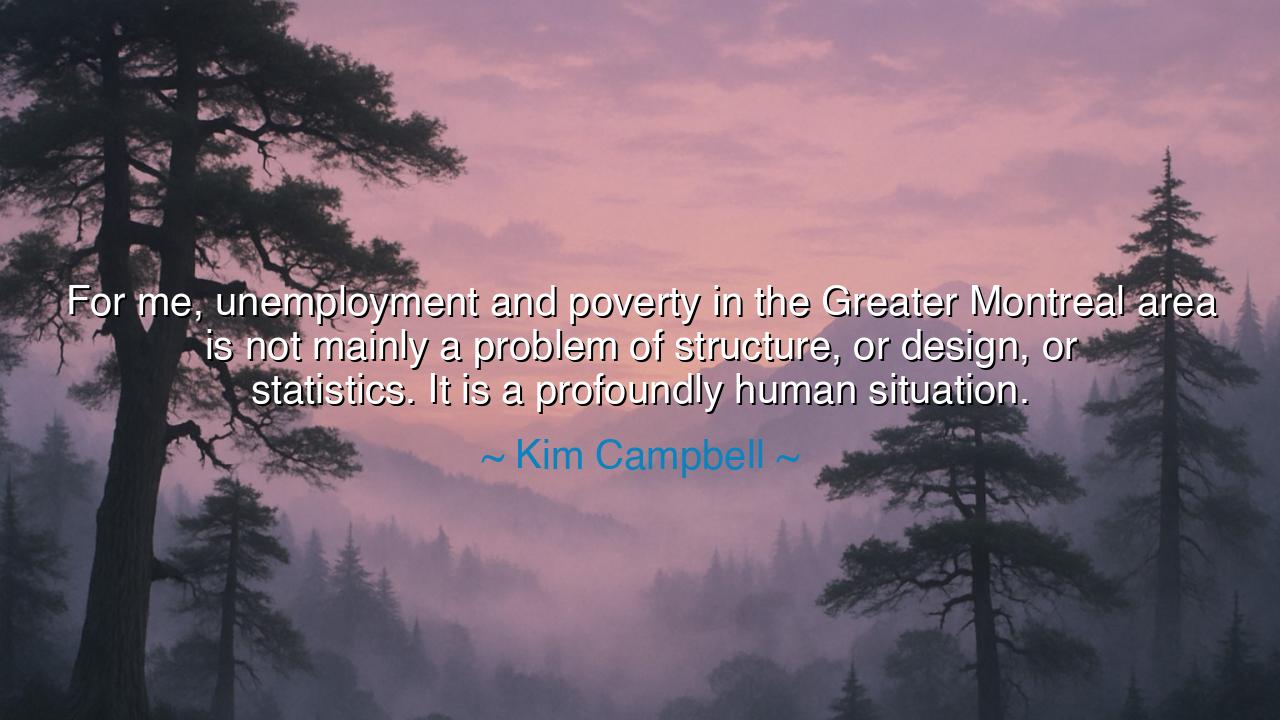
For me, unemployment and poverty in the Greater Montreal area is
For me, unemployment and poverty in the Greater Montreal area is not mainly a problem of structure, or design, or statistics. It is a profoundly human situation.






“For me, unemployment and poverty in the Greater Montreal area is not mainly a problem of structure, or design, or statistics. It is a profoundly human situation.” Thus spoke Kim Campbell, the first woman to serve as Prime Minister of Canada, whose words cut through the abstractions of policy and power to touch the beating heart of governance itself. Her statement is more than political observation—it is moral philosophy. In these few words, Campbell reminds us that beyond the cold machinery of economics and the sterile language of data, there live real souls: mothers and fathers, elders and youth, each carrying the quiet weight of survival.
In the ancient world, wisdom often began when leaders recognized the human face behind the numbers. The philosopher-king, as described by Plato, was not one who mastered systems alone, but one who understood the suffering and joy of his people as his own. Kim Campbell, too, speaks in that tradition. She warns that when we treat poverty and unemployment as mere structures to be analyzed, or statistics to be debated, we risk forgetting the sacred truth that they are lived realities—wounds in the flesh of our shared humanity.
The modern mind, enamored with systems and graphs, often forgets that poverty is not born from data but from despair. It is the ache of the father who returns home without bread, the quiet shame of the young graduate whose talents find no place in the world, the fatigue of the mother who counts coins under the fading light. Campbell’s words call us back from the realm of abstraction to the realm of compassion. “A profoundly human situation,” she says—and in those four words, she restores dignity to what the world too often renders invisible.
History offers us countless reminders of what happens when societies forget this truth. Consider the Industrial Revolution, when progress was measured in steel and smoke, and yet the workers who built that progress lived in squalor. Governments of the time spoke of production and profit, but not of hunger or exhaustion. It was not until reformers like Florence Nightingale and Charles Dickens gave voice to the voiceless that the world began to see that poverty is not merely an economic flaw—it is a moral failure. Their compassion awakened nations to the understanding Campbell now echoes: that human well-being must stand above economic perfection.
And yet, Campbell’s insight goes beyond pity. She does not call for sentiment, but for understanding—for policies born not from ideology, but empathy. To see poverty as “human” is to recognize that every person’s struggle is woven into the social fabric. It means acknowledging that unemployment is not only the loss of income, but the erosion of purpose, of belonging, of self-worth. It is to see that healing such wounds requires not just programs and budgets, but connection—a society that listens, reaches out, and believes in the dignity of each individual.
There is power in this kind of seeing. When a government, a community, or even a single person begins to look upon the poor not as problems but as neighbors, transformation begins. The ancient sage Confucius taught that a ruler’s virtue is measured not by the wealth of his nation, but by how he treats the hungry. The same truth endures: progress that forgets humanity is no progress at all. Kim Campbell’s words remind us that the measure of civilization is not found in GDP or growth charts, but in the warmth of its compassion.
So let this be the teaching drawn from her words: do not let the human face disappear behind the system. When you speak of policy, remember the person. When you discuss reform, remember the family it will touch. Statistics may describe the problem, but only empathy can solve it. Let every leader, teacher, and citizen remember that the world is not healed by numbers, but by hands that help and hearts that listen.
For as Kim Campbell reminds us, poverty and unemployment are not failures of design alone—they are mirrors held to the soul of humanity. And if we dare to look closely, not with calculation but with compassion, we may yet find that the truest progress lies not in structure, but in solidarity—in remembering, always, that beneath every system, there beats a human heart.






AAdministratorAdministrator
Welcome, honored guests. Please leave a comment, we will respond soon